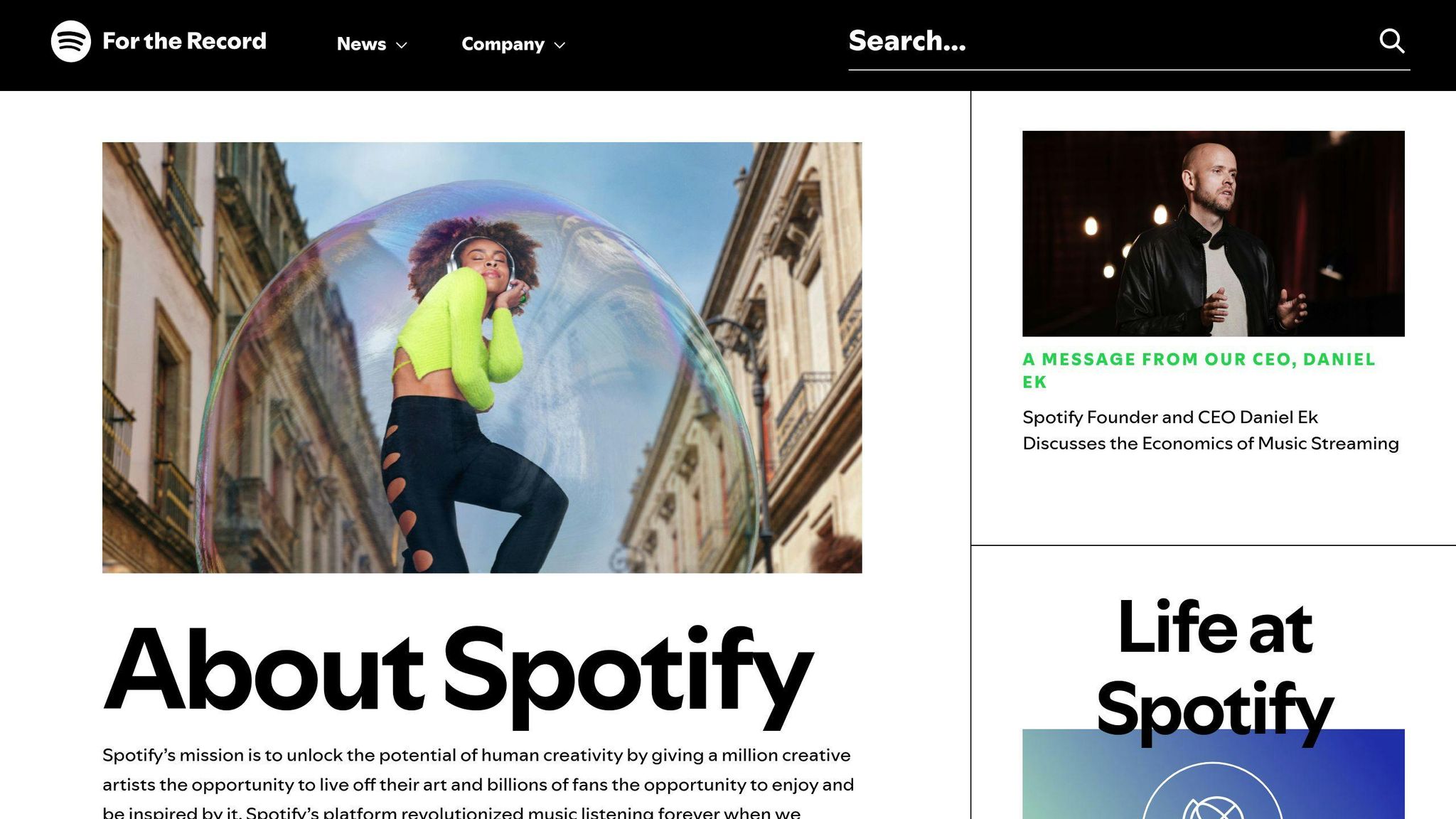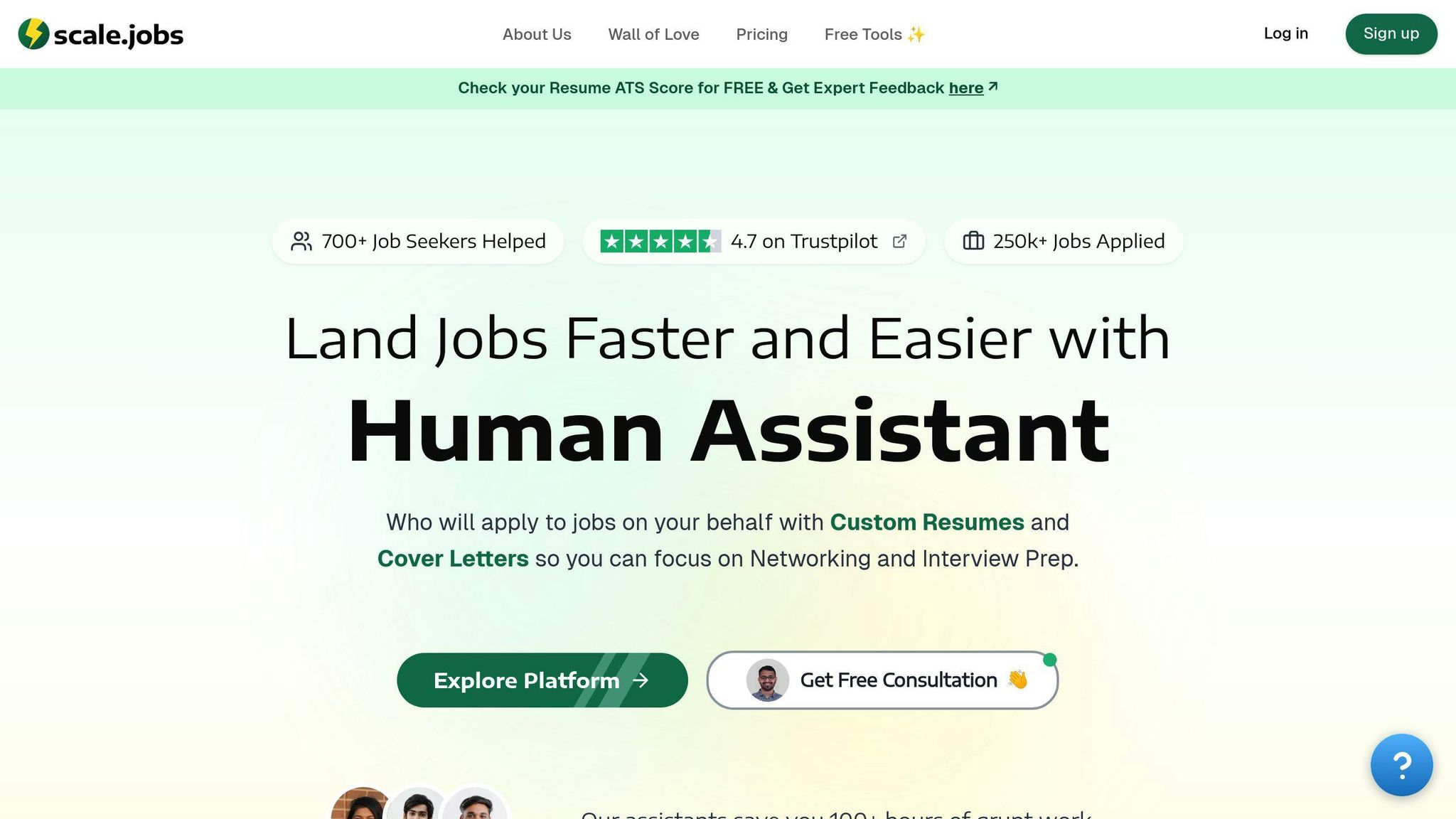Spotify's Work-From-Anywhere Policy Lessons
Explore how flexible work policies enhance employee satisfaction and productivity, alongside tools for job seekers in a changing job market.

Spotify’s Work-From-Anywhere (WFA) policy has reshaped modern work by offering employees full flexibility on where and how they work. This approach, introduced in 2021, has reduced employee turnover by 15% and sped up hiring processes by six days compared to pre-pandemic levels. While companies like Amazon and Meta enforce stricter office policies, Spotify’s model prioritizes trust and autonomy for employees.
Key Takeaways:
- Flexibility: Employees choose their work location, with hybrid options and physical offices for collaboration.
- Results: 15% lower turnover (2022 vs. 2019) and improved hiring efficiency.
- Challenges: Maintaining creativity and collaboration remotely.
- Solutions: Initiatives like "core week" events and partnerships with the Stockholm School of Economics to study remote work’s impact.
Spotify’s WFA policy serves as a guide for businesses adapting to flexible work models and for job seekers seeking roles with freedom. Platforms like scale.jobs complement this shift by offering tools like resume checkers and affordable virtual assistant services for $4/hour to simplify job searches.
| Aspect | Spotify's WFA Policy | scale.jobs Services |
|---|---|---|
| Flexibility | Location freedom, hybrid options | 24/7 support, tailored application tools |
| Productivity | Lower attrition, better work-life balance | Streamlined job search, interview prep |
| Challenges | Remote collaboration issues | Balancing automation with personalization |
Spotify’s approach and scale.jobs’ tools highlight how flexibility and modern solutions can redefine the workplace for both employers and job seekers.
How Spotify is building a Work from Anywhere culture

1. Spotify's WFA Policy
Spotify's Work-From-Anywhere (WFA) policy allows employees to decide where they work best. This approach aligns with Spotify's belief in trusting employees as responsible professionals. As Katarina Berg, Spotify's Chief Human Resources Officer, puts it:
"You can't spend a lot of time hiring grown-ups and then treat them like children".
The policy has boosted workplace culture by encouraging diversity and engagement. While Spotify maintains physical offices for in-person collaboration, it also organizes "core week" events where teams come together. These gatherings often feature live music to inspire team connection and creativity.
Spotify addresses the challenges of remote work by studying its effects on innovation and productivity, constantly refining its strategies. For example, the company adapts to local labor laws by redistributing nighttime tasks, balancing employee well-being with business needs.
Unlike Amazon and Meta, which enforce stricter office policies, Spotify provides a flexible model that serves as a guide for both job seekers looking for freedom and employers navigating modern work environments.
2. scale.jobs Services

As Spotify's WFA policy reshapes workplace flexibility, scale.jobs keeps pace by offering tools and services designed for today's job market. The platform provides job seekers with cost-effective virtual assistant support at just $4/hour, allowing candidates to focus on interviews while saving time on tedious tasks.
For those in the tech industry, especially individuals affected by layoffs, scale.jobs helps target flexible positions, including roles similar to Spotify's. The platform simplifies the process with tools like a resume ATS checker, a cover letter generator, and a salary predictor - making job applications easier and more effective.
International job seekers also gain access to tailored assistance for navigating visa-related challenges. The virtual assistants are knowledgeable about various visa types and can guide candidates toward companies with suitable work arrangements. This kind of specialized help is especially useful as more organizations adopt diverse workplace policies.
Scale.jobs empowers job seekers to find roles that align with their preferences, whether remote, hybrid, or otherwise, ensuring they are better prepared for today's dynamic job market.
Advantages and Disadvantages
Spotify's Work-From-Anywhere (WFA) policy and scale.jobs' services bring unique strengths and challenges to the modern workplace. Here's a closer look at how they address the needs of today's workforce.
| Aspect | Spotify's WFA Policy | scale.jobs Services |
|---|---|---|
| Flexibility | • Full location freedom • Self-managed schedules • Hybrid options available |
• 24/7 application support • Flexible service hours • Customizable application timing |
| Productivity | • 15% lower attrition rate • Maintained collaboration • Better work-life balance |
• Time-saving tools • Targeted interview prep • Streamlined job search |
| Challenges | • Difficulty maintaining collaboration and creativity in remote setups | • Balancing automation with personalization across industries |
Spotify has seen clear benefits from its WFA policy, including a 15% drop in attrition rates in 2022 compared to 2019. By giving employees autonomy and trusting their professional judgment, Spotify has created an environment that supports satisfaction and retention.
On the other hand, scale.jobs focuses on job seekers, offering affordable virtual assistance for $4/hour. As flexible work policies like Spotify's grow in popularity, scale.jobs provides tools like ATS checkers and salary predictors to help individuals navigate the shifting job market.
Both approaches face their own hurdles. Spotify works to address remote collaboration issues with initiatives like "core week" and live music sessions. Meanwhile, scale.jobs strives to maintain a balance between automation and personalization to ensure quality across various industries.
Spotify has also partnered with the Stockholm School of Economics to explore how remote work impacts innovation and productivity. This collaboration underscores their commitment to refining virtual teamwork while keeping the benefits of flexibility intact.
These examples reflect the changing dynamics of work flexibility, offering valuable lessons for both employers and job seekers in adapting to the future of work.
Conclusion
Spotify's Work-From-Anywhere policy highlights how offering flexibility can improve employee satisfaction and deliver results, such as a 15% drop in attrition rates. Their approach underscores the value of trusting employees to focus on outcomes rather than physical location.
Spotify's methods, like their collaboration with the Stockholm School of Economics and hosting 'core week' events, show how flexibility can coexist with teamwork and productivity. This balance provides a roadmap for other organizations navigating the changing workplace.
As companies like Spotify embrace flexible work models, platforms like scale.jobs help job seekers adapt. Their $4/hour virtual assistance streamlines the job application process, giving candidates more time to network and prepare for interviews. This service becomes even more useful as global opportunities grow with flexible work policies.
The evolving workplace requires a mix of autonomy and connection. Businesses should explore hybrid models that combine remote work freedom with intentional in-person collaboration. For job seekers, focusing on employers offering this balance and leveraging modern job search tools can open the door to more rewarding career paths in this new era of work.




